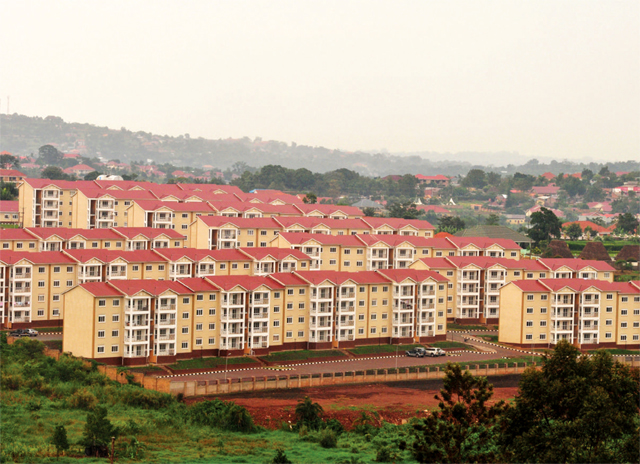
Housing Estate
Naalya. INDEPENDENT/
JIMMY SIYA
Rental offices are being re-occupied but landlords and occupiers will incur extra costs to meet health and safety measures
Kampala, Uganda | ISAAC KHISA | Residential properties in Kampala have recorded an average of 16% decline in rental rates owed to restricted air travel of expatriates in the wake of coronavirus pandemic, latest report from the property agency, Knight Frank Uganda, shows.
The report that covers six months of this year shows that rent for prime properties that are usually associated with expatriates have fallen from US$2,250 in 2019 to US$ 1,860 in 2020 for two-bedroomed apartments. The rental rates for a three-bedroomed apartments have also declined from US$2, 750 to US$2,360 during the same period under review as occupancy falls.
The occupancy rates for the two types of apartments have declined from 78% in 2019 to 69.9% this year.
Judy Rugasira, managing director Knight Frank Uganda said it is most likely that the leasing activity will remain below par during this period as coronavirus has restricted travel globally stifling demand.
“The mass exodus of over 1,000 foreign nationals back to their countries at the announcement of lockdown in Uganda left the fate of many tenancies for private rented accommodation in limbo,” she said.
“…our outlook on future rental appreciation is (therefore) bleak and we expect rents to either remain stagnant or slide under the current uncertain economic scenario.”
Uganda announced various measures including lockdowns and travels in March to curb the spread of coronavirus.
Rugasira said the pandemic has impacted investor confidence and cashflows, which will defer real estate purchase decisions to the distant future.
She said the net cash flows of residential developers will witness some decline on account of the coronavirus pandemic.
The report notes that the residential property segment which already suffered a weak demand found it difficult to launch new projects and or complete the ongoing ones due to construction halts and labour shortages.
“The transactions which were in the process of being concluded were (also) put on hold, but are slowly being revived by interested parties,” Rugasira said.
This development comes amidst increased supply of residential properties in Kampala that outstripped demand forcing
landlords to discount their rents in order to be competitive and reduce voids given the slow economic trend.
For instance during the first half of this year, the supply of residential apartment units increased from 2,006 to 2,230 during the same period last year. This represents an 11% surge.
Retail trading remain uncertain
Similarly, the report notes that the post-lockdown outlook for retail trading is uncertain, and most landlords have undertaken to give stimulus solutions to their tenants on a case by case basis, so as to allow deferred rentals for up to six months.
“The main purpose being to achieve an optimum outcome which balances the consequences of the lockdown on both parties, against the symbiotic and mutual relationship needed for retail business to succeed,” notes the report, adding that retail rental rates remained stable in the first quarter of 2020, but such will probably contract by approximately 30% post lockdown, depending on the ability of the general economy to bounce back, and consumer spending to return to pre-Covid 19 levels.
For office space properties, the property management firm envisage a 10-20% reductions on net annual collections for prime office properties this year as proprietors offer rental discounts or deferred payments.
However, Rugasira says the office segment is expected to be impacted in various ways in addition to the reduction in annual collections as a result of the pandemic.
Firstly, she says, low density use of buildings as a result of social distancing could mean constricting margins and lower profitability for businesses, particularly Small and Medium Enterprises and this will in turn affect capital values.
Secondly, the pandemic will certainly impose challenges on rental and capital growth, and it is highly likely that the segment will see falling rents and capital values over the short to mid-term; particularly in sub – prime properties where majority of tenants are from the SME sector, and are unable to leverage off the balance sheets or financial support of global parent companies.
Thirdly, it is probable that the pandemic will have a long-term impact on real estate debt given that the commercial real estate market is heavily debt dependent, she said. Like all other property segments, industrial property has been experiencing suppressed demand and steadily falling rents over the past few years, and the trend is expected to continue as a result of the pandemic that has disrupted supply chain.
This is due to the fact that the pandemic has affected wholesale traders and retail business which is the biggest source of demand for storage space. “Entire logistics and supply chains were affected and are yet to recover as trucks from neighboring East African countries pile up at the border as they go through the testing and tracking process before being allowed to proceed,” the report adds.
Moving forward Moving forward as the country continues to ease lockdown, Knight Frank executives say rental offices are being re-occupied but landlords and occupiers will incur additional costs on health and safety during this post the pandemic period.
“We will see the role of flexible offices offering a stop gap solution to businesses especially for those looking at reducing their staff density ratios in the wake of Covid 19.
This solution will allow for the flexibility of short leases for plug and play space,” the executives said.
The executives added that tenants will be looking for rent concessions and or deferred rent payments to allow them the breathing space to reopen and revive their businesses after lockdown.
However, they project a possible occupier fallout for the weaker businesses which are more cash flow dependent than others.
****
 The Independent Uganda: You get the Truth we Pay the Price
The Independent Uganda: You get the Truth we Pay the Price



